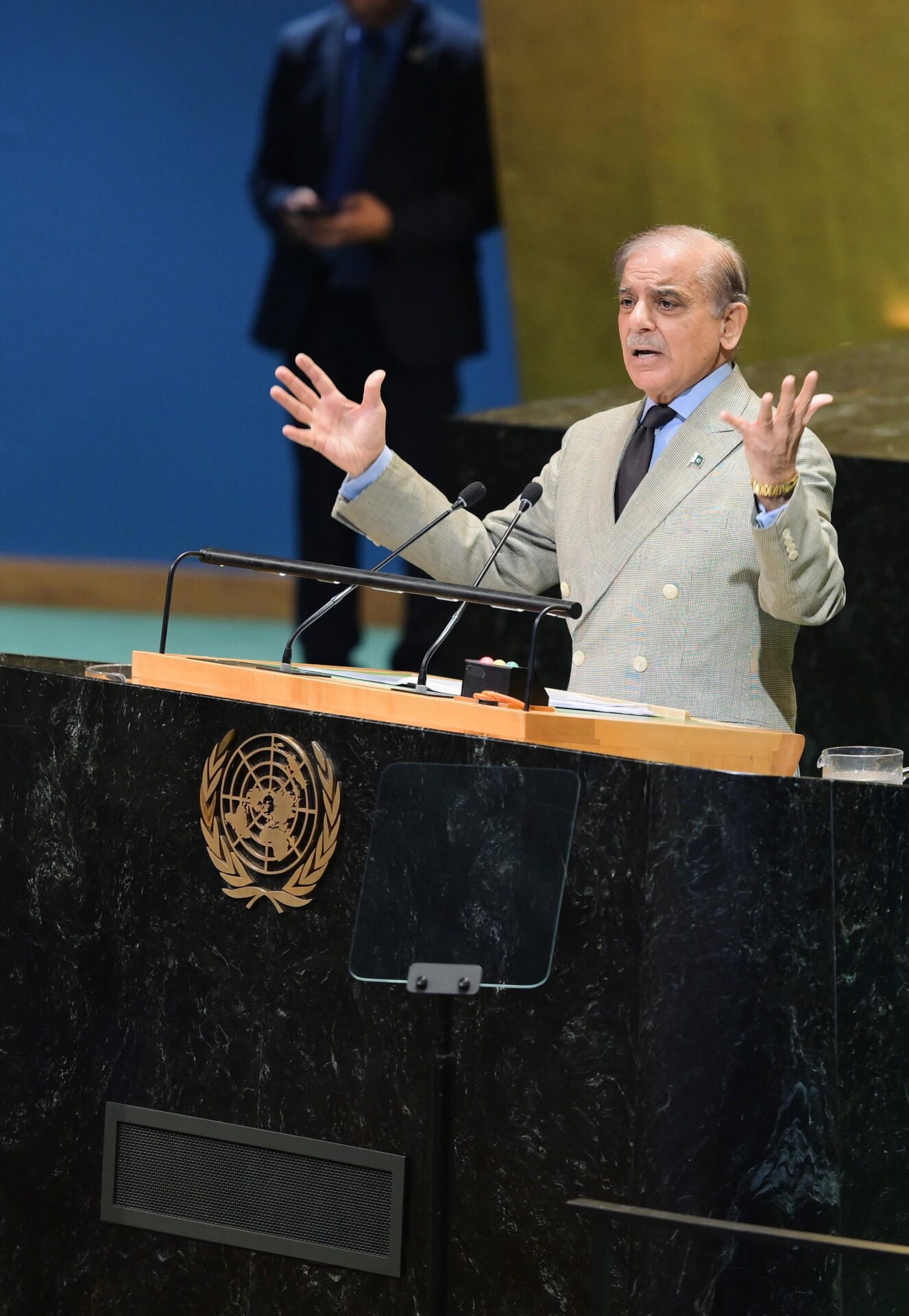 New York, 26 September 2025 (Kamran Raja): Prime Minister Muhammad Shehbaz Sharif today addressed the General Debate of the 80th Session of the United Nations General Assembly.
New York, 26 September 2025 (Kamran Raja): Prime Minister Muhammad Shehbaz Sharif today addressed the General Debate of the 80th Session of the United Nations General Assembly.
In his address, the Prime Minister congratulated the President of the General Assembly and paid tribute to UN Secretary-General António Guterres for his bold and principled leadership during challenging global times.
The Prime Minister highlighted the complex and interlinked challenges facing the world, including intensifying conflicts, violations of international law, multiplying humanitarian crises, externally sponsored terrorism, disinformation, an unrestrained arms race, and the existential threat posed by climate change. He emphasized that multilateralism, with the United Nations at its core, was indispensable to addressing these pressing challenges.
Underscoring Pakistan’s foreign policy vision rooted in peace, respect, and cooperation, the Prime Minister reiterated Pakistan’s belief in the peaceful settlement of disputes through dialogue and diplomacy.
Referring to the events of May 2025, the Prime Minister recalled that Pakistan had successfully repulsed unprovoked aggression from India. He lauded the professionalism and bravery of Pakistan’s Armed Forces and reiterated the nation’s determination to defend its sovereignty and territorial integrity. He expressed gratitude to President Donald Trump for his timely intervention in facilitating a ceasefire, which averted a wider conflict in South Asia. The Prime Minister also thanked Pakistan’s friends and partners, including China, Turkiye, Saudi Arabia, Qatar, Azerbaijan, Iran, the UAE, and the UN Secretary-General for their diplomatic support.
Reaffirming Pakistan’s readiness to pursue peace, the Prime Minister called for comprehensive and result-oriented dialogue with India on all outstanding issues, particularly the Jammu and Kashmir dispute. He denounced India’s unilateral actions regarding the Indus Waters Treaty and reiterated Pakistan’s resolve to protect the rights of its people.
The Prime Minister strongly condemned India’s ongoing repression in Indian Illegally Occupied Jammu and Kashmir, assuring the Kashmiri people of Pakistan’s steadfast political, diplomatic, and moral support for their right to self-determination under UN Security Council resolutions.
Turning to the Middle East, the Prime Minister expressed grave concern over the plight of the Palestinian people, denouncing Israel’s continued occupation, atrocities in Gaza, and attacks on civilians. He reaffirmed Pakistan’s unwavering support for the establishment of a sovereign Palestinian state with pre-1967 borders and Al-Quds Al-Sharif as its capital. He welcomed recent recognition of the State of Palestine and called on other countries to follow suit.
The Prime Minister condemned terrorism in all its forms and manifestations, recalling Pakistan’s sacrifices as a frontline state in the global fight against terrorism. He highlighted the continuing threat of externally sponsored terrorist groups operating from Afghan soil and reaffirmed Pakistan’s determination to eliminate terrorism in all its forms.
On Afghanistan, he stressed Pakistan’s commitment to regional stability, humanitarian assistance, economic recovery, and an inclusive political framework in the country. He urged the Interim Afghan Government to ensure Afghan soil is not used for terrorism and to uphold human rights, including women’s rights.
The Prime Minister drew attention to the devastation caused by climate change, recalling Pakistan’s catastrophic floods of 2022 and 2025. Despite contributing less than 1% to global emissions, Pakistan remains among the most vulnerable countries. He reiterated the urgent need for climate finance and support for adaptation and resilience in developing countries.
On the economic front, the Prime Minister outlined Pakistan’s reforms in taxation, investment, and digital transformation, and highlighted priority sectors including energy, agriculture, technology, and infrastructure. He reaffirmed Pakistan’s commitment to partnerships under the China-Pakistan Economic Corridor and acknowledged President Xi Jinping’s global initiatives for inclusive development and governance.
As a non-permanent member of the UN Security Council, the Prime Minister reaffirmed Pakistan’s constructive role in conflict prevention, peacekeeping, and peacebuilding. He reiterated Pakistan’s call for comprehensive reform of the Security Council to make it more effective, democratic, and representative, cautioning against adding new permanent members which would exacerbate paralysis and selectivity.
Concluding his address, Prime Minister Shehbaz Sharif reaffirmed Pakistan’s commitment to peace, justice, development, and inclusive multilateralism. He called on the international community to mark the UN’s 80th anniversary not only by commemorating history but by making history, charting a cooperative and hopeful future for humanity.